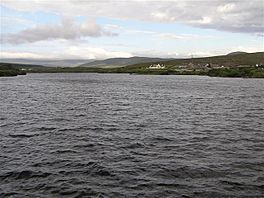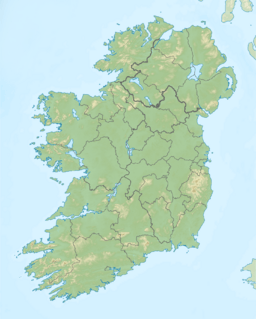Dunglow Lough facts for kids
Quick facts for kids Dunglow Lough |
|
|---|---|
 |
|
| Location | County Donegal |
| Coordinates | 54°57′16″N 8°20′35″W / 54.95444°N 8.34306°W |
| Native name | Loch an Chlocháin Léith Error {{native name checker}}: parameter value is malformed (help) |
| Primary inflows | Lough Craghy |
| Primary outflows | Dungloe River |
| Catchment area | 37.67 km2 (14.5 sq mi) |
| Basin countries | Ireland |
| Max. length | 1.4 km (1 mi) |
| Max. width | 0.7 km (0.4 mi) |
| Surface area | 0.61 km2 (0.24 sq mi) |
| Average depth | 1.3 m (4 ft 3 in) |
| Max. depth | 7.5 m (25 ft) |
| Surface elevation | 13 m (43 ft) |
| Islands | Flat Island, Fern Island, Black Island, Brush Island, Wren Island |
Dunglow Lough (which is Loch an Chlocháin Léith in Irish) is a lovely freshwater lake. It is also known as Dungloe Lough. You can find it in the northwest part of Ireland. This lake is located in northern County Donegal, within an area called the Rosses fishery.
Contents
Exploring Dunglow Lough's Location
Dunglow Lough is quite close to the town of Dungloe. It sits about 1 kilometer (0.6 miles) to the east of the town. The lake is about 1.5 kilometers (0.9 miles) long. It is also around 1 kilometer (0.6 miles) wide.
Islands of Dunglow Lough
This interesting lake has five islands that have names. These islands are Flat Island, Fern Island, Black Island, Brush Island, and Wren Island. They add to the lake's natural beauty.
How Water Flows Through Dunglow Lough
Dunglow Lough is part of a natural water system. It gets its water from another nearby lake.
Water Coming In
On its eastern side, Dunglow Lough is fed by Lough Craghy. This means water flows from Lough Craghy into Dunglow Lough.
Water Flowing Out
From Dunglow Lough, the water then flows westwards. It empties into the Dungloe River. This river carries the water away from the lake.
Animals Living in Dunglow Lough
Dunglow Lough is home to different kinds of fish. It is an important place for wildlife.
Fish Species in the Lake
You can find several fish species in Dunglow Lough. These include brown trout and salmon. There is also the European eel, which is a critically endangered species. This means it is very important to protect them.


